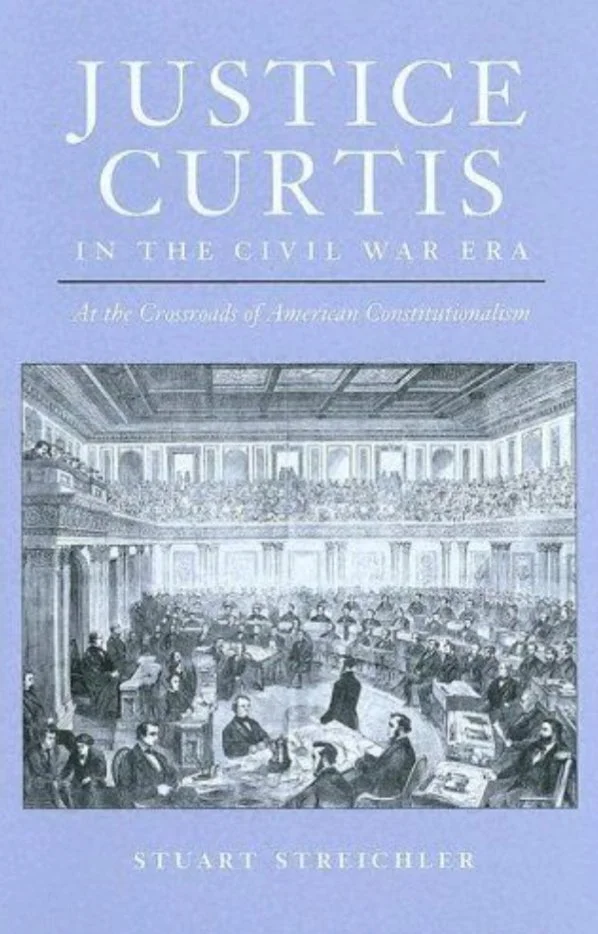Publications
Books
Presidential Accountability in Wartime: President Bush, the Treatment of Detainees, and the Laws of War (University of Michigan Press, 2023). Without flinching, this book addresses a controversial issue involving human rights and the American presidency. What happens to a U.S. president who violates the laws of war and, as difficult as it may be to acknowledge, commits war crimes? Nothing–if the early years of the war against terrorism provide any indication. Read more.
Justice Curtis in the Civil War Era: At the Crossroads of American Constitutionalism (University of Virginia Press, 2005) examines the age of Civil War as a critical juncture in American constitutional development through an in-depth analysis of Supreme Court Justice Benjamin R. Curtis. Read more.
Articles and Essays
“Watergate’s Ironic Legacy.” Boston Review, June 16, 2022.
Presents a contrarian interpretation of Watergate by pointing out how the scandal made it harder to check the abuse of presidential power.
“The War Crimes Trial That Never Was: An Inquiry into the War on Terrorism, the Laws of War, and Presidential Accountability.” University of San Francisco Law Review 45 (2011): 959-1004.
Critically evaluates the Bush administration’s treatment of detainees under international humanitarian law by exploring some facets of a hypothetical criminal war crimes trial.
“The Illusion of Accountability: The Idea of an American Truth Commission on Torture.” Global Dialogue, vol.12 (Winter/Spring 2010).
Questions whether an independent commission is an appropriate accountability mechanism to investigate allegations of prisoner abuse in the war against terrorism.
“What Would Warren Do? A Brief Historical Comment on Brown and Parents Involved.” Tennessee Law Review 76 (2008): 159-86.
Argues that the Supreme Court’s plurality opinion in Parents Involved distorted the central meaning of Brown v. Board of Education by stripping the principles stated in that landmark opinion from the historical and cultural context in which they were made.
“Mad about Yoo, or, Why Worry about the Next Unconstitutional War?”Journal of Law & Politics 24 (2008): 93-128.
Analyzes historical, textual, and structural arguments concerning the constitutional distribution of legislative and executive powers with regard to the use of military force abroad.
“The Worst Decision Ever?” Legal Times, March 12, 2007.
Reconsiders the case brought by Dred Scott as the forerunner of modern civil rights litigation, notwithstanding the Supreme Court’s proslavery ruling.
“Capital Punishment: Arbitrariness Undermines Integrity of Justice System.” Miami Herald, July 13, 2006.
Reflects on systemic flaws undermining the administration of the death penalty since the Supreme Court reinstated capital punishment in 1976.
“Brown v. Board of Education and Judicial Craftsmanship.” Education Law Review 35 (2006): 178-90.
Building on Jack M. Balkin’s edited collection of revisionist opinions in What Brown v. Board of Education Should Have Said, this essay argues that, when seen in political context, Chief Justice Warren’s opinion was a model study of legal craftsmanship, contrary to the conventional view.
“War, Politics, and the U.S. Constitution Today.” Nomos 16 (2005): 41-50.
Argues that a structural method of constitutional interpretation offers the most promising analytic approach to determine how to allocate institutional authority over the power to go to war.
“Justice Curtis’s Dissent in the Dred Scott Case: An Interpretive Study.” Hastings Constitutional Law Quarterly 24 (1997): 509-44.
Offers a new interpretation of Curtis’s constitutional arguments by outlining the potentially far-reaching implications of his discussion of Black citizenship and by explaining his structural argument justifying Congress’s plenary power over slavery in the territories.
“Gergengate.” The Nation, July 19, 1993.
“Double Jeopardy and Federal Prosecution after State Jury Acquittal.” Michigan Law Review 80 (1982): 1073-94.
Explores the values underlying the Fifth Amendment’s Double Jeopardy Clause to justify a legal test that accommodates federal prosecutorial interests in protecting civil rights against the double jeopardy rights of defendants in high-profile cases of police misconduct.
Book Reviews
Review of Cords of Affection: Constructing Constitutional Union in Early American History, by Emily Pears. In American Political Thought 12 (2023): 463-66.
Review of The Great Dissenter: The Story of John Marshall Harlan, America’s Judicial Hero, by Peter S. Canellos. In American Political Thought 11 (2022): 280-83.
Review of The People’s Darling Privilege: Struggles for Freedom of Expression in American History, by Michael Kent Curtis. In Law and Politics Book Review 11 (2001): 324-26.
Review of Abraham Lincoln, Constitutionalism, and Equal Rights in the Civil War Era, by Herman Belz. In American Journal of Legal History 43 (1999): 108-9.
Review of The Supreme Court Reborn: The Constitutional Revolution in the Age of Roosevelt, by William E. Leuchtenburg. In American Journal of Legal History 40 (1996): 223-24.


